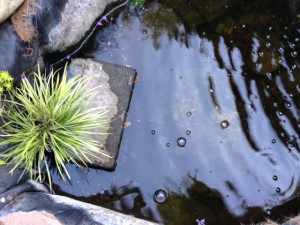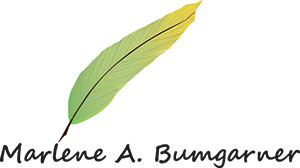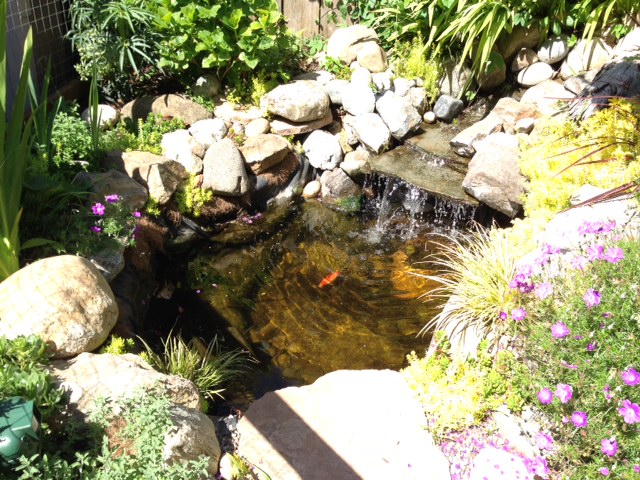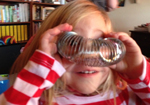When I purchased my sweet little house in Santa Cruz, it came with a waterfall and a pond. That summer I experienced the joy of falling asleep to the peaceful sound of falling water. In time, though, the pond became green with algae and began to need regular attention. The county Vector Control Specialist provided mosquito fish and suggested we improve the pond ecology with more fish and some frogs and plants, and I began to study how people kept predators out of their ponds.
About that time my granddaughter decided the current residents of the pond were boring anyway, so we went to the local pet shop and brought home a plastic bag full of tiny goldfish. Most of them died over the next few months, and we replaced the bagful a couple of times, but miraculously, four hardy fish survived one summer, one fall, and one winter. Meanwhile we had added tadpoles and water lilies, iris and several underwater pond plants. We had occasional visits from skunks and racoons, who wreaked havoc with the plantings and stirred up all the algae, but the four amazing fish retreated to their hiding places behind broken terra cotta pots, and thrived.
The fish and the pond had become an important part of our life together.
When they emerged from the depths of the dark pond in March after their winter dormant period, the four fish were huge, and their distinctive markings made it quite easy for Bean to name each one. Each morning I would walk to the pond and call to them, then, when they appeared, sprinkle their food on the surface. (Yes, even though goldfish have no external ears, they can hear sounds via the vibrations in the water). How quickly we fall into routines. Feeding the fish became a pleasant part of my morning and evening ritual, and sometimes I would just lean on the fence that encloses the pond for fifteen or twenty minutes, listening to the sound of the water and watching the fish chase one another away from the food, or circling the tank to get to a bigger morsel. It was calming.
If I knew that Bean was coming over that day, I would only feed the fish half rations in the morning, because the pond was the first place she would go when she arrived. When she was two and we were losing fish as fast as we were buying them, she didn’t take too much notice of the individual fish, but still enjoyed feeding them. When she was three, I allowed her to lie on her tummy on the tiles beside the pond and watch the fish swim around. By the time she was four, Bean had named the fish and took charge of the feeding herself, talking to each fish in turn as the granules fell to the bottom of the pond and the fish followed them down. I’ll never forget the first time a shimmering blue dragonfly landed on one of the tiles just in front of Bean’s little face. She was mesmerized by it.
I came home from a conference Sunday evening and went into the garden to feed the fish as usual, but there was no sight of them. The water level in the pond was very low, and some of the plants were in disarray. Sadly, I went to bed and had nightmares about racoons. Monday morning, the food was still sitting on the bottom of the pond, and still there were no fish to be seen. I called their names and threw out some more food, but they didn’t come out from their hiding places. I found myself going to the pond almost hourly to check on the fish (“They must be there!”). Finally, 24 hours after arriving home, the food still sitting on the bottom of the pond, I finally acknowledged that our four fiesty fish were gone. Leaning over the fence and gazing at the pond, thinking how violent the end of their lives must have been, tears welled up. I felt rather foolish, but just the same I wept for the fish and for the hole in our lives their leaving would make. I also cried for Bean, who will miss her little friends, and who has not yet had many experiences of loss.
Then I got angry. Yes, I know the five stages of grief, as you probably do, and I know that’s the next one after denial. But knowing it doesn’t prevent it from happening. I’ve spend hundreds of dollars paying a humane trapper to remove racoons from my garden; I’ve purchased motion sensor lights and buzzers and mountain lion poo in an effort to keep the racoons away from the fish. But while I was out of town, my monthly gardening helper had come to clear out leaves and weeds, and apparently turned off the lights and the buzzer that I had set before I left. The racoon family might have come to visit anyway, but for an hour or two I was furious with my gardener. I almost called him and told him what had happened, then decided that would not be helpful. But being angry made me feel better.
Grief is a very strange thing. Although their meaning in our lives may be different, in some ways, grieving for goldfish is just like grieving the loss of anyone we love. Their death leaves a hole in our heart, and we quite naturally try to deny it, get angry at it, bargain with it and so on . . . but death is final, and down deep we know it. The more we experience loss, it seems to me, the more intensely we feel each new loss, because it triggers the memories and the emotions we felt during those other losses. So was I crying for four missing goldfish, or for my mother, for my father, for all the dear friends I have lost through the years, or for Becca, our loyal canine companion? Probably for all of them. And so I cried, and I fumed, and I grieved.
I went out to the pond tonight, not expecting to see any fish, but just because it’s part of my  night time ritual. As I stood there, looking into the dark, empty water, letting the anger and sadness wash over me, the sound of the water began to work its magic, and I gradually began to feel at peace. There will be other fish, and other plants, and Bean and I will continue to enjoy the fishpond and its residents. This loss is not really anything like the loss of losing my mother, or my father, my dear friends, or even Becca. I am just grieving the goldfish, and I will get over it.
night time ritual. As I stood there, looking into the dark, empty water, letting the anger and sadness wash over me, the sound of the water began to work its magic, and I gradually began to feel at peace. There will be other fish, and other plants, and Bean and I will continue to enjoy the fishpond and its residents. This loss is not really anything like the loss of losing my mother, or my father, my dear friends, or even Becca. I am just grieving the goldfish, and I will get over it.
Share this post





Dear Marlene,Thank you for your story,of Love..and loss of your beloved Fish.it has provided much needed comfort,hat I’m not alone in my feelings of Loss of a goldfish Our(my) dear ,beautiful ,copper colored,comet goldfish Penni,would have been 11 this year. He and his mate,Mooni,a white comet were playful in their aquarium on Mother’s day..they loved “hearing” my youner Son play Ravel,on the piano..up until a few days ago ,Penni seemed fine,dancing for his food,swimming happily..suddenly,with in two days,he had passed over..no warning of illness,and it made me feel worse..frustrated,I didn’t know what was wrong with him and couldn’t save him. He is wrapped in my Rosary with a few flowers..and will be buried in my yard. You said it right..”a Hole in our Hearts”..MIssing them..also that even without them,feeling them around because they are a Habit of Love..
Belita,
I am so sorry for your loss. This is a lovely tribute to Penni. The average lifespan of a goldfish is 8-10 years, so he was a definite elder, like me. It sounds like he had a lovely life, but I know you will have that hole in your heart for a while yet. Love is like that.
Marlene
This is beautiful and profound. Thank you for sharing this touching story, and reminding us that all losses are losses, regardless of how great or small. The presence of anything meaningful in our lives touches us forever, and all losses leave an emptiness in our souls in some way, and that deserves to be acknowledged not ignored.
I think sometimes people feel embarrassed to grieve a goldfish or small creature because they feel it’s silly and they will be laughed at. However, it shouldn’t be that way. Meaningful things come into our lives in many forms- small, large, and every size in between. Sometimes seemingly “small” things make a big impact, perhaps even more than we realized after they’re gone.
When something of meaning disappears from our daily experience, for whatever reason, it causes a flood of emotions, sadness, and reflections.
I’ve lost fish too, and I completely understand these emotions and how the creatures can become such an integral part of your life; Not to mention they’re adorable and friendly. We as humans can become very emotionally connected to creatures of all kinds and it’s hard to let go of that connection. I feel God gave us animals for joy, healing, and as companions in this journey, so of course it’s natural we would feel a close bond with them, regardless of species. There’s even a saint just for animals! (St. Francis of Assisi).
I am sorry about the loss of your faithful garden companions. Hopefully they are swimming in a pond where no raccoons can find them,and that they are thankful for the love you shared while they were in your care. Thank you for sharing this meaningful story 🙂
Thank you Denise, for your heartfelt response to my goldfish story. This week the loss is also very heavy, not the loss of goldfish but of hope for our girls, for the future of the United States as a haven for the tired, the poor, the huddled masses yearning to breathe free. As for the goldfish, however, at the urging of my granddaughter and some pain to my pocketbook, I had my waterfall and pond completely rebuilt last spring to contain lots of hiding places for fish. We now have a dozen fairly large goldfish coming up on six months old. So far so good!
Marlene